英语常用单词用法详细介绍
up和down的用法
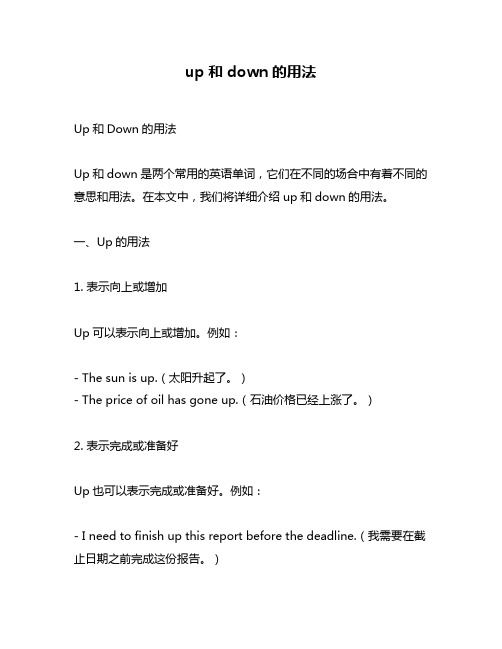
up和down的用法Up和Down的用法Up和down是两个常用的英语单词,它们在不同的场合中有着不同的意思和用法。
在本文中,我们将详细介绍up和down的用法。
一、Up的用法1. 表示向上或增加Up可以表示向上或增加。
例如:- The sun is up.(太阳升起了。
)- The price of oil has gone up.(石油价格已经上涨了。
)2. 表示完成或准备好Up也可以表示完成或准备好。
例如:- I need to finish up this report before the deadline.(我需要在截止日期之前完成这份报告。
)- Are you all packed up and ready to go?(你已经打包好了,准备出发了吗?)3. 表示改善或恢复Up还可以表示改善或恢复。
例如:- After a good night's sleep, I feel much better today.(经过一晚上的好睡眠,我今天感觉好多了。
)- We need to clean up this room before our guests arrive.(我们需要在客人到来之前把这个房间打扫干净。
)4. 表示增强或加强Up还可以表示增强或加强。
例如:- She needs to beef up her resume if she wants to get a good job.(如果她想得到一份好工作,她需要充实自己的简历。
)- I need to work on my upper body strength so I can do more push-ups.(我需要加强上半身力量,这样我就能做更多俯卧撑了。
)5. 表示完成或吃完Up还可以表示完成或吃完。
例如:- Are you done with your homework?(你的作业做完了吗?)- I'm almost done with my dinner.(我快要把晚饭吃完了。
必学英语单词

必学英语单词
英语作为全球通用语言,是世界上最重要的语言之一。
学好英语,掌握常用的英语单词是入门的必要条件。
下面将介绍一些必学的英语单词。
1. Hello:你好
Hello是英语中最常用的问候语,表示问候和打招呼。
在英语交流中,Hello是最基本的礼节用语,在职场,学校,旅游等不同场合都需要用到。
掌握hello这个单词,对于初学英语的人来说是很重要的。
2. Thank you:谢谢
Thank you是表达感激之情的最常用语,也是英语中最基本的礼貌用语之一。
在英语交流中,Thank you是非常重要的,表示你的礼貌和尊重。
在和英语国家的人交流时,掌握这个单词可以增加良好的交流氛围。
3. Goodbye:再见
Goodbye是表达离别时常用的用语,也是英语中最常用的告别语。
掌握这个单词,可以表达出你在离别时的诚挚祝福,也能够增加与英语国家人民之间的友谊。
4. Yes:是
在英语中,Yes是表示肯定回答的用语,是最常用的肯定回答。
在日常交流中,Yes是非常实用的词汇。
学会使用Yes,可以更好地表达出你的意思和态度。
5. No:不
No是表示否定回答的用语,也是英语中最常用的否定回答。
在日常交流中,No是非常实用的词汇。
掌握这个词汇,可以让你在交流中更加自信和准确。
总之,以上几个英语单词是必学的基础单词,对于初学者来说非常重要。
学会使用这些常用的单词,可以让你在英语交流中更加自信和自如。
当然,除了这些单词之外,还有很多其他的英语单词也是必学的,希望大家可以持续学习,不断提高自己的英语水平。
最实用的英语单词

最实用的英语单词英语是全球通用的语言之一,无论是在学习、工作还是生活中都有着重要的地位。
而在英语的学习中,最基本的就是掌握一些实用的单词。
下面,本文将对最实用的英语单词进行介绍。
1. Hello/HiHello和Hi都是表示问候的常用单词,可以用在不同的场合中,如见面礼节、打电话、发邮件等。
这两个单词的使用方式简单明了,非常适合初学者使用。
2. Thank youThank you是表示感谢的单词,无论是口语还是书面语中都非常常见。
在日常生活中,可以用来回答别人帮助自己的提问,也可以用来向别人表达感谢之情。
3. SorrySorry是表示道歉的单词,可以用在多种场合中,如在做错事时、在与人发生矛盾时等。
全球通用的单词,是英语中应用频率非常高的单词。
4. GoodbyeGoodbye是表示告别的单词,常常用于结束对话或是离开某个场所时。
这个单词非常实用,因为不管是与陌生人,还是与熟人,离别时这个单词都是必备的。
5. Yes/NoYes和No分别是表示肯定和否定的单词,也是最常用的两个单词之一。
这两个单词用法简单,可以用于回答很多问题,例如是否同意某个提议、是否能接受某些条件等。
6. PleasePlease是表示请求的单词,可以将其加在请求或指示的话语前面,以表达礼貌。
在请求他人帮助或是请求别人做某件事情时,这个单词是必备的。
7. Excuse meExcuse me是表示请求别人注意或是打扰别人的单词。
例如,在过道狭窄的公共场所走路时,你可能需要在与别人擦肩时说“Excuse me”以表示礼貌;或是在找人帮忙时,先用“Excuse me”引起别人的注意。
8. I/Me/MineI、Me和Mine都是表示自己的单词,这些单词使用频率非常高。
在与人交流时,常常需要用到这些单词。
此外,这些单词还可以用来对自己和他人进行概括,如“I am happy”或是“This is mine”。
9. You/YourYou和Your是表示“你”的单词,这些单词同样也是英语中应用频率非常高的单词之一。
五十英文单词
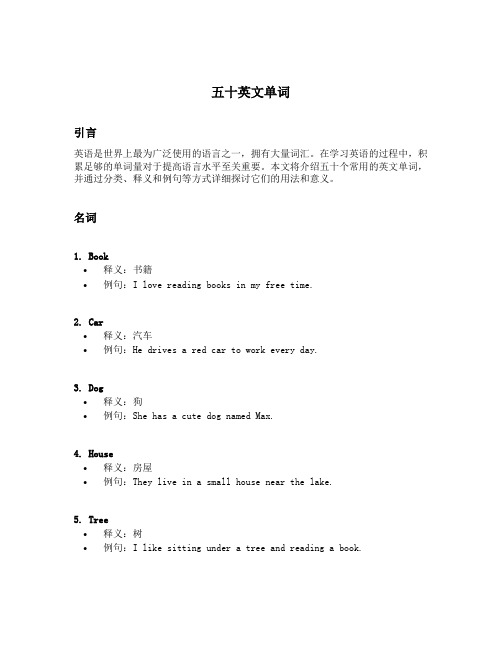
五十英文单词引言英语是世界上最为广泛使用的语言之一,拥有大量词汇。
在学习英语的过程中,积累足够的单词量对于提高语言水平至关重要。
本文将介绍五十个常用的英文单词,并通过分类、释义和例句等方式详细探讨它们的用法和意义。
名词1. Book•释义:书籍•例句:I love reading books in my free time.2. Car•释义:汽车•例句:He drives a red car to work every day.3. Dog•释义:狗•例句:She has a cute dog named Max.4. House•释义:房屋•例句:They live in a small house near the lake.5. Tree•释义:树•例句:I like sitting under a tree and reading a book.动词6. Eat•释义:吃•例句:They like to eat pizza for dinner.7. Run•释义:跑•例句:She runs every morning to keep fit.8. Sleep•释义:睡觉•例句:I usually sleep for eight hours every night.9. Study•释义:学习•例句:He studies English for two hours every day.10. Work•释义:工作•例句:They work in a big company in the city.形容词11. Big•释义:大的•例句:The elephant is a big animal.12. Small•释义:小的•例句:She has a small backpack for traveling.13. Happy•释义:快乐的•例句:They were happy to see each other again.14. Sad•释义:伤心的•例句:He felt sad after hearing the bad news.15. Beautiful•释义:美丽的•例句:The sunset over the ocean was a beautiful sight.副词16. Always•释义:总是•例句:She always arrives early for the meeting.17. Never•释义:从不•例句:He never forgets to say thank you.18. Often•释义:常常•例句:They often go hiking on the weekends.19. Sometimes•释义:有时候•例句:I sometimes eat ice cream as a treat.20. Very•释义:非常•例句:The movie was very exciting and suspenseful.介词21. In•释义:在…里面•例句:She put her keys in the drawer.22. On•释义:在…上面•例句:He placed the book on the table.23. At•释义:在…处•例句:They met at the park for a picnic.24. From•释义:从…来•例句:The package is from my friend who lives in another country.25. To•释义:到…去•例句:We are going to the beach next weekend.数词26. One•释义:一个•例句:He has one sister and two brothers.27. Two•释义:两个•例句:I bought two tickets for the concert.28. Three•释义:三个•例句:She has three cats as pets.29. Four•释义:四个•例句:They bought four apples at the market.30. Five•释义:五个•例句:He needs five minutes to get ready.代词31. I•释义:我•例句:I like to drink coffee in the morning.32. You•释义:你•例句:Do you want to go to the movies with me?33. He•释义:他•例句:He is my best friend.34. She•释义:她•例句:She is a talented artist.35. They•释义:他们/她们•例句:They are going on a vacation together.连词36. And•释义:和•例句:I like to drink tea and eat cookies.37. But•释义:但是•例句:He likes to travel, but he doesn’t have much free time.38. Or•释义:或者•例句:Do you want coffee or tea?39. Because•释义:因为•例句:They couldn’t go to the party because they were busy.40. If•释义:如果•例句:If it rains, we will stay home.状态词41. Good•释义:好的•例句:She is a good student and always gets excellent grades.42. Bad•释义:坏的•例句:He had a bad day at work.43. Better•释义:更好的•例句:She felt better after taking some medicine.44. Best•释义:最好的•例句:He won the award for the best performance.45. Difficult•释义:困难的•例句:The math problem was very difficult to solve.时间词46. Year•释义:年•例句:They got married last year.47. Month•释义:月•例句:She is going on a vacation next month.48. Week•释义:周•例句:I have a meeting at the end of the week.49. Day•释义:天•例句:He goes for a walk every day.50. Hour•释义:小时•例句:She studied for three hours for the exam.总结本文介绍了五十个常用的英文单词,包括名词、动词、形容词、副词、介词、数词、代词、连词、状态词和时间词等各个词类。
七年级下册英语重点单词用法归纳
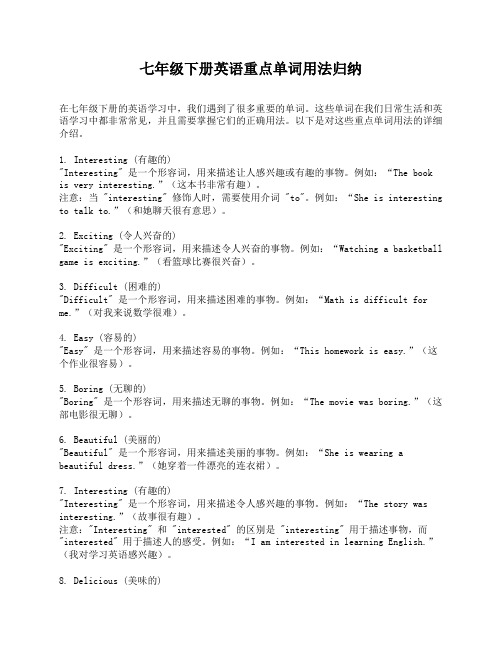
七年级下册英语重点单词用法归纳在七年级下册的英语学习中,我们遇到了很多重要的单词。
这些单词在我们日常生活和英语学习中都非常常见,并且需要掌握它们的正确用法。
以下是对这些重点单词用法的详细介绍。
1. Interesting (有趣的)"Interesting" 是一个形容词,用来描述让人感兴趣或有趣的事物。
例如:“The book is very interesting.”(这本书非常有趣)。
注意:当 "interesting" 修饰人时,需要使用介词 "to"。
例如:“She is interesting to talk to.”(和她聊天很有意思)。
2. Exciting (令人兴奋的)"Exciting" 是一个形容词,用来描述令人兴奋的事物。
例如:“Watching a basketball game is exciting.”(看篮球比赛很兴奋)。
3. Difficult (困难的)"Difficult" 是一个形容词,用来描述困难的事物。
例如:“Math is difficult for me.”(对我来说数学很难)。
4. Easy (容易的)"Easy" 是一个形容词,用来描述容易的事物。
例如:“This homework is easy.”(这个作业很容易)。
5. Boring (无聊的)"Boring" 是一个形容词,用来描述无聊的事物。
例如:“The movie was boring.”(这部电影很无聊)。
6. Beautiful (美丽的)"Beautiful" 是一个形容词,用来描述美丽的事物。
例如:“She is wearing a beautiful dress.”(她穿着一件漂亮的连衣裙)。
7. Interesting (有趣的)"Interesting" 是一个形容词,用来描述令人感兴趣的事物。
中考英语—重点单词用法
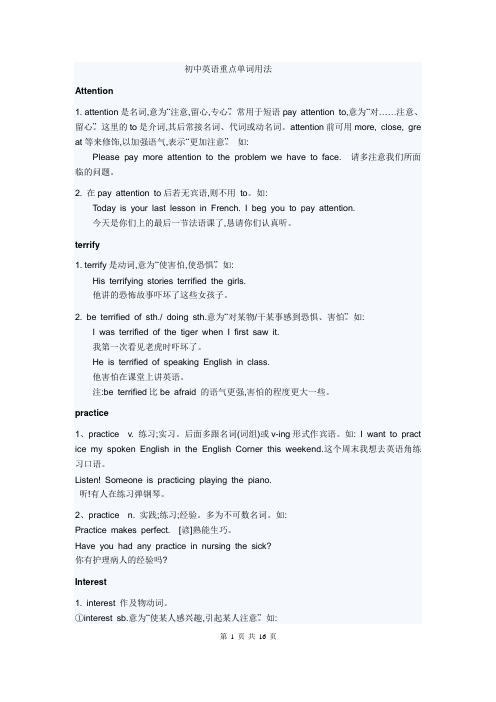
初中英语重点单词用法Attention1. attention是名词,意为“注意,留心,专心”。
常用于短语pay attention to,意为“对……注意、留心”。
这里的to是介词,其后常接名词、代词或动名词。
attention前可用more, close, gre at等来修饰,以加强语气,表示“更加注意”。
如:Please pay more attention to the problem we have to face. 请多注意我们所面临的问题。
2. 在pay attention to后若无宾语,则不用to。
如:T oday is your last lesson in French. I beg you to pay attention.今天是你们上的最后一节法语课了,恳请你们认真听。
terrify1. terrify是动词,意为“使害怕,使恐惧”。
如:His terrifying stories terrified the girls.他讲的恐怖故事吓坏了这些女孩子。
2. be terrified of sth./ doing sth.意为“对某物/干某事感到恐惧、害怕”。
如:I was terrified of the tiger when I first saw it.我第一次看见老虎时吓坏了。
He is terrified of speaking English in class.他害怕在课堂上讲英语。
注:be terrified比be afraid 的语气更强,害怕的程度更大一些。
practice1、practice v. 练习;实习。
后面多跟名词(词组)或v-ing形式作宾语。
如: I want to pract ice my spoken English in the English Corner this weekend.这个周末我想去英语角练习口语。
Listen! Someone is practicing playing the piano.听!有人在练习弹钢琴。
英语单词用法

1.individuals,characters, folks替换(people ,persons)2: positive, favorable, rosy (美好的),promising (有希望的),perfect, pleasurable , excellent, outstanding, superior替换good3:dreadful, unfavorable, poor, adverse, ill (有害的)替换bad如果bad做表语,可以有be less impressive替换eg.An army of college students indulge themselves in playing games, enjoying romance withgirls/boys or killing time passively in their dorms. When it approaches to graduation ,as a result, they find their academic records are less impressive.4.(an army of, an ocean of, a sea of, a multitude of ,a host of, many, if not most)替换many. 注:用many, if not most 一定要小心,many后一定要有词。
Eg. Many individuals, if not most, harbor the idea that….同理用most, if not all ,替换most. 5: a slice of, quiet a few , several替换some6:harbor the idea that, take the attitude that, hold the view that, it is widely shared that, it is universally acknowledged that)替think (因为是书面语,所以要加that)7:affair ,business ,matter 替换thing8: shared 代 common9.reap huge fruits 替换get many benefits )10:for my part ,from my own perspective 替换 in my opinion11:Increasing(ly),growing 替换more and more( 注意没有growingly这种形式。
英语作文万能单词
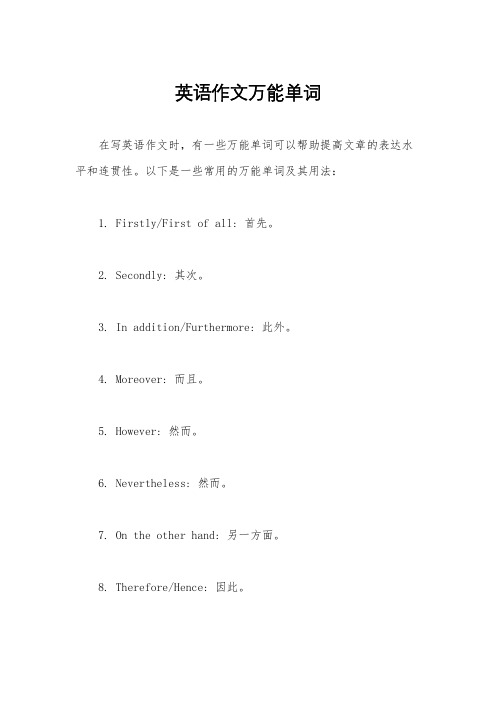
英语作文万能单词在写英语作文时,有一些万能单词可以帮助提高文章的表达水平和连贯性。
以下是一些常用的万能单词及其用法:1. Firstly/First of all: 首先。
2. Secondly: 其次。
3. In addition/Furthermore: 此外。
4. Moreover: 而且。
5. However: 然而。
6. Nevertheless: 然而。
7. On the other hand: 另一方面。
8. Therefore/Hence: 因此。
9. Consequently: 结果。
10. Furthermore: 此外。
11. In conclusion: 总之。
12. To sum up: 总结。
在写作时,可以巧妙地运用这些万能单词来连接句子和段落,使文章的逻辑结构更加清晰,表达更加流畅。
同时,还可以使用一些形容词和副词来丰富文章的词汇,使其更加生动有趣。
例如:1. Excellent: 优秀的。
2. Outstanding: 出色的。
3. Remarkable: 非凡的。
4. Furthermore, the excellent performance of the students in the competition demonstrates their outstanding abilities and dedication to their studies.5. Additionally, the remarkable progress made by the company in recent years highlights its commitment to innovation and excellence.总的来说,熟练运用这些万能单词可以帮助提高英语作文的表达水平,使文章更加连贯和生动。
- 1、下载文档前请自行甄别文档内容的完整性,平台不提供额外的编辑、内容补充、找答案等附加服务。
- 2、"仅部分预览"的文档,不可在线预览部分如存在完整性等问题,可反馈申请退款(可完整预览的文档不适用该条件!)。
- 3、如文档侵犯您的权益,请联系客服反馈,我们会尽快为您处理(人工客服工作时间:9:00-18:30)。
常用单词用法1.劝告advise caution warn admonish counseladvise: 普通用词,vet/vi,泛指劝告,不涉及对方是否听从劝告。
用法:及物动词advise+ thatWe advised her that she (should) wait.我们劝她等。
Advise sb against doing sth/ sth 劝某人不做某事We advised him against acting in haste.我们劝他不要匆忙行事。
不及物动词advise againstI advised against their doing it.我劝他们不要做这件事。
名词:(不可数)advice劝告, 忠告, 意见;消息, 报道; (商业)通知Give advice 提供建议,劝告take advice 接受建议,劝告caution : 主要指针对有潜在危险而提出的警告,含小心从事的意味。
及物动词&不及物动词警告,告诫,使小心[(+about/against/for)]caution oneself against error谨防有误The policeman cautioned me for parking here.警察警告我不可在此停车。
名词:(不可数)小心, 谨慎, 慎重, 警告Caution is the parent of safety.小心驶得万年船。
warn: 含义caution 同,但语气较重,尤指重后果。
及物动词/不及物动词1.警告;告诫;提醒[(+of/against/about)]He warned me against going outside alone at night.他提醒我晚上不要单独出去。
The police warned us not to go out at night.警察告诫我们夜间不要出门。
They warned him of/about the danger.他们警告他有危险。
2.预先通知[(+of)The weather station warned that a hurricane was coming.气象台预报飓风即将来临。
admonish: 一般指年长者或领导对已犯错误的或有过失的人提出的忠告或警告以避免类似错误。
及物动词劝告, 训诫;(温和地)责备,轻责Admonish your friends in private, praise them in public.明赞朋,暗谏友。
Mr. Green admonished me for drinking too much.格林先生警告我喝酒太多了。
counsel: 正式用词,语气比advise强一些,侧重指对重要问题提出的劝告、建议或咨询。
及物动词劝告,忠告;提议[(+on)][O2]His job is to counsel students on how to choose a career.他的工作是辅导学生就业。
名词忠告, 劝告;辩护律师, 法律顾问;商议,审议Give counsel 提供咨询take counsel with sb 征求某人意见2.保护defend protect safeguard guard shield shelter harbor defend: 普通用词,指用武力或其它措施使人或物不受损害,消除危险。
用作比喻时,指坚持某种行动、决定或意见。
及物动词&不及物动词防御;保卫;保护We shall defend our city, whatever the cost may be.不管代价如何,我们要捍卫我们的城市。
compel sb. to defend himself迫使进行自卫defend the honor of one's country维护国家的声誉Defend with采取…手段保卫【律】为...辩护;作...的辩护律师She defended herself successfully in court.她在法庭上成功地为自己作了辩护。
protect: 普通用词,指用某种手段作为防御工具以防危险或伤害。
及物动词保护,防护[(+against/from)]May God protect you from harm.愿上帝保佑你免受伤害。
Wearing dark glasses can protect your eyes from the sun.戴墨镜可以保护眼睛不受阳光刺激。
protect intellectual property保护知识产权safeguard: 语气强,指采取积极措施预防可能发生的一切攻击或危。
及物动词保护;防卫[(+from)]This agreement will safeguard the newspapers from government interference.这一协议将保护报纸不受政府干涉。
为...提供防护措施Insurance will safeguard your property.保险会使你的财产得到保障。
safeguard lawful rights and interests维护合法权益名词可数名词保护;防卫;预防措施;保证条款[(+against)]The new law constitutes a safeguard against the abuse of government power.新法律可以防止滥用政府权力。
guard: 普通用词,指保持警惕以防可能的攻击或伤害。
及物动词&不及物动词[(+against/from)]guard against external aggression防御外来侵略A helmet guards your head against/from injuries.头盔可以保护你的头部免受伤害。
名词(可数)警戒, 警惕, 守卫;卫兵;防护装置shield: 语气比protect强,但侧重防止迫在眉睫的攻击或伤害。
保护;保卫[(+from)]Her hat shielded her eyes from the sun.她的帽子遮住太阳光保护她的眼睛。
庇护;包庇;掩盖He lied to the court to shield his friend.他对法庭说谎以包庇自己的朋友。
挡开,避开[(+off)]These trees will shield off arid winds名词(可数)盾, 盾牌;护罩; 防护物Dark glasses are an effective shield against the glare.墨镜能有效地遮挡强光。
shelter : 通常指寻找安全地方躲避风雨或使人免遭危害。
及物动词(使)掩蔽,遮蔽;庇护;保护[(+from)]The wall sheltered us from the wind.墙壁遮挡着,使我们免遭风吹。
She was accused of sheltering a murderer.她被指控隐匿凶手。
不及物动词躲避;避难[Q][(+from)]They sheltered from the sun under a tree.名词遮盖物;躲避处;避难所[可数][(+from)]The umbrella is a poor shelter from heavy rain.雨伞不太遮挡得住大雨。
掩蔽,遮蔽;庇护,保护;避难[不可数[(+from)]Their immediate need is for food, clothing and shelter. 他们所急需的是吃的,穿的和住的。
harbor: 贬义词,指隐匿或非法保护、窝藏。
及物动词庇护;藏匿;收养(动物等)He is accused of harboring an escaped convict.他被指控窝藏逃犯。
心怀,怀有He still harbors a grudge against me.他对我仍怀有怨恨。
不及物动词(船)入港停泊;躲入安全地;躲藏;居住;生存Crabs harbor in holes.蟹躲藏在洞里。
名词(可数&不可数)3.“结束,完成”complete finish end close conclude terminate accomplish complete: 侧重指完成预定的任务或使某事完善,补足缺少的部分等。
使齐全;使完整Complete the sentences in the exercise by filling in the blanks.在空白处填充使练习中各句成为完整句。
完成;结束By the end of August we had completed the work.我们到八月底就完成了这项工作。
形容词完整的;全部的;完全的,彻底的finish: 与complete基本同义,着重圆满地结束或完成已着手的事。
及物动词&不及物动词结束,完成;用完;吃完We'll never finish if we go on at this rate.以这样的速度, 我们永远也完不成。
Finish off your food.吃干净吧。
名词结束, 完成, 最后阶段end: 最普通用词,着重事情的完成。
也指某种活动因达到目的而自然结束或由于某种原因而突然中止。
及物动词&不及物动词终止,结束The strike was ended.罢工已经结束。
名词最后部分,结尾,死去close: 普通用词,着重行为的终止或结束,不强调其目的。
及物动词&不及物动词关闭,终止;结束;结清(帐目);商定(交易)The company has decided to close down its three branches in Europe.该公司已决定关闭它在欧洲的三个分公司。
I have closed my account at that bank.我已结清了我在该银行的帐户。
形容词亲近的,关系密切的;势均力敌的;接近的Close relationship密切的关系Close to danger濒临险境名词终点,结束conclude : 正式用词,多指以某事或活动达到预期目的而告终。
结束[(+by/with)]We concluded our meeting at 9 o'clock.我们九点钟结束了会议。
推断出,断定[W][Y][+that]From his appearance we may safely conclude that he is a chain smoker.从他的外表,我们可以有把握地断定他烟抽得很凶。
